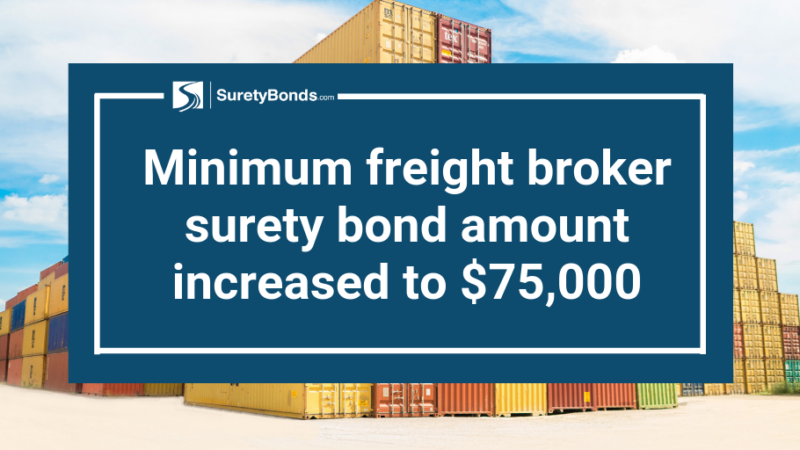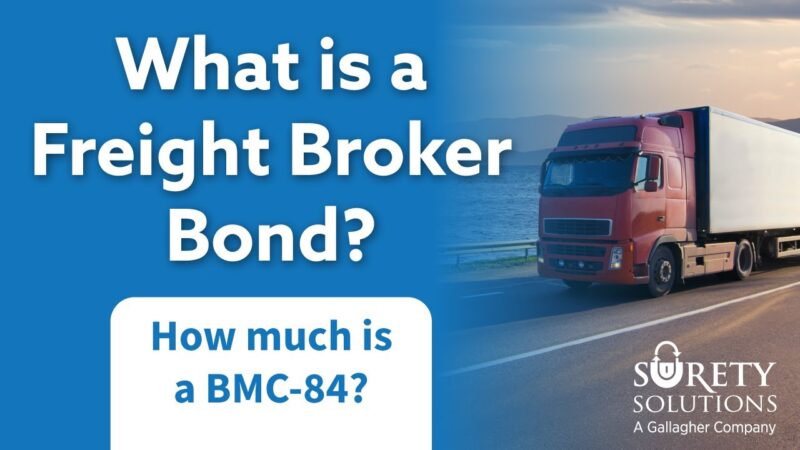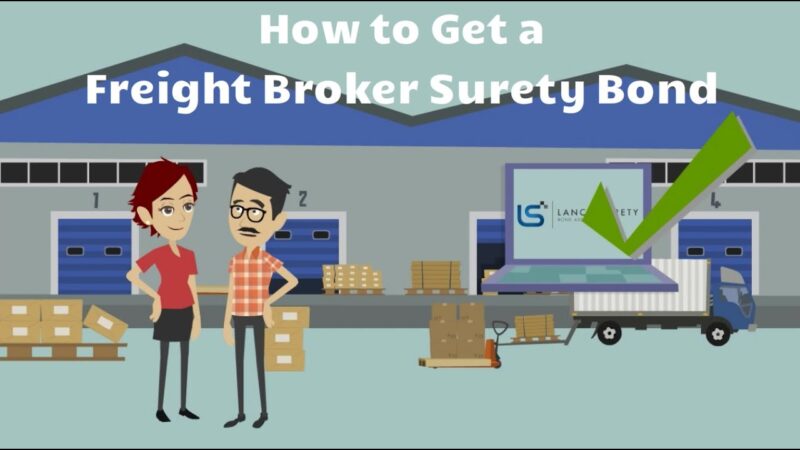As you delve into the world of freight brokerage, one essential aspect you must grasp is the freight broker bond requirements. But what exactly does this term entail? In this article, we will embark on a journey to unravel the intricacies of freight broker bond requirements, their significance, and why complying with them is crucial for your success in the industry.
Mục lục
- 1. What is a Freight Broker Bond and Why is it Necessary?
- 2. The Importance of Understanding and Complying with Bond Requirements
- 3. Understanding the Freight Broker Bond
- 4. Legal Requirements for Freight Broker Bonds
- 5. Obtaining a Freight Broker Bond
- 6. Maintaining Compliance with Freight Broker Bond Requirements
- 7. Conclusion

What is a Freight Broker Bond and Why is it Necessary?
A freight broker bond, also known as a BMC-84 bond, is a form of surety bond that guarantees financial protection for shippers and carriers working with freight brokers. Its primary purpose is to ensure that the freight broker adheres to their obligations and responsibilities, including proper payment of carriers and shippers. Essentially, this bond acts as a safety net, safeguarding the interests of all parties involved in the freight transportation process.
The Importance of Understanding and Complying with Bond Requirements
Now that we know what a freight broker bond is, let’s explore why understanding and complying with its requirements is paramount. By understanding the bond requirements, you gain a comprehensive insight into the legal obligations and responsibilities that come with operating as a freight broker. This knowledge empowers you to navigate the industry confidently and ethically.
Meeting the bond requirements is not only a legal obligation but also a testament to your professionalism and trustworthiness. It instills confidence in your clients, carriers, and shippers, positioning you as a reliable and responsible partner. By fulfilling these requirements, you demonstrate your commitment to upholding industry standards and protecting the interests of all stakeholders.
In the subsequent sections, we will delve deeper into the intricacies of freight broker bond requirements, exploring the legal framework, the process of obtaining a bond, and the consequences of non-compliance. So, fasten your seatbelt and prepare to embark on a journey that will equip you with the knowledge and tools needed to thrive in the freight brokerage industry.
Stay tuned for the upcoming sections, where we will dive into the nitty-gritty of freight broker bond requirements, legality, and the steps involved in obtaining a bond. Remember, understanding and meeting these requirements pave the way for a successful and reputable career as a freight broker.
Next section: Understanding the Freight Broker Bond
Understanding the Freight Broker Bond

Definition and Types of Freight Broker Bonds
To navigate the world of freight broker bond requirements, it is essential to have a solid understanding of the different types of bonds that exist. Two common types of freight broker bonds are:
- BMC-84 Bond: Also known as a property broker bond, this type of bond is required by the Federal Motor Carrier Safety Administration (FMCSA) for freight brokers. It provides financial protection to shippers and carriers in case the broker fails to fulfill their contractual obligations, such as payment for transportation services.
- BMC-85 Bond: This bond is an alternative to the BMC-84 bond. Rather than relying on a surety bond, the BMC-85 bond involves the freight broker providing collateral in the form of cash or other assets. This collateral serves as a guarantee for payment to shippers and carriers in case of default.
Overview of the Bond Amount and How it is Determined
The bond amount, also known as the bond limit, is the maximum coverage provided by the freight broker bond. The FMCSA mandates a minimum bond requirement of $75,000 for freight brokers. However, the actual bond amount required may vary based on various factors, such as the broker’s history, financial standing, and the volume of freight they handle.
The bond amount is determined by assessing the broker’s financial stability and risk factors associated with their operations. A broker with a solid track record and a lower risk profile may secure a bond at a lower premium, while those with a higher risk profile may face higher costs.
Additionally, the bond amount may need to be adjusted periodically to reflect the broker’s growth and changes in their business operations. It is crucial for brokers to regularly review their bond coverage to ensure it aligns with their current requirements.
Understanding the different types of freight broker bonds and the factors that influence the bond amount provides valuable insights into the financial aspects of the freight brokerage industry. In the upcoming section, we will explore the legal requirements set by the FMCSA and the consequences of failing to meet these obligations.
Next section: Legal Requirements for Freight Broker Bonds
Legal Requirements for Freight Broker Bonds

Navigating the intricate web of legal requirements is essential for any freight broker. In this section, we will explore the specific legal framework surrounding freight broker bond requirements, focusing on the regulations set by the Federal Motor Carrier Safety Administration (FMCSA) and the consequences of non-compliance.
FMCSA Regulations: A Regulatory Roadmap
The FMCSA, a division of the U.S. Department of Transportation, plays a vital role in overseeing the transportation industry. As a freight broker, understanding the FMCSA regulations is paramount to ensure compliance and avoid penalties. These regulations outline the precise requirements for freight broker bonds, leaving no room for ambiguity.
Specific Bond Requirements: Meeting the Criteria
The FMCSA mandates specific bond requirements that freight brokers must meet to operate legally. These requirements typically revolve around the bond amount, which varies depending on factors such as the broker’s financial standing and the volume of shipments brokered. It is crucial to thoroughly understand these requirements and ensure that your bond satisfies the criteria set by the FMCSA.
Consequences of Non-Compliance: Navigating Troubled Waters
Failure to meet the legal requirements for freight broker bonds can have serious repercussions. Non-compliance exposes you to penalties, fines, and the potential loss of your authority as a freight broker. Moreover, it can tarnish your reputation and negatively impact your relationships with carriers and shippers. By complying with the legal requirements, you not only avoid these consequences but also build a trustworthy and reputable image within the industry.
Now that we have explored the legal requirements surrounding freight broker bonds, it is crucial to understand the process of obtaining a bond. In the next section, we will unravel the steps involved in securing a freight broker bond and shed light on factors to consider when choosing a bond provider.
Next section: Obtaining a Freight Broker Bond
Obtaining a Freight Broker Bond

As you embark on the journey to become a freight broker, one of the crucial steps is obtaining a freight broker bond. Let’s explore the process involved in obtaining this bond, factors to consider when selecting a bond provider, and cost considerations that can help you optimize your premiums.
Process of Obtaining a Freight Broker Bond
Obtaining a freight broker bond may seem like a complex process, but with the right guidance, it can be streamlined. Here’s a breakdown of the typical steps involved:
- Research and Identify Bond Providers: Begin by researching reputable bond providers that specialize in freight broker bonds. Look for providers with a solid track record and a thorough understanding of the industry requirements.
- Application Submission: Once you’ve identified a suitable bond provider, you’ll need to complete an application form. This form will require essential information about your business, such as your financial history, experience in the industry, and compliance with regulatory requirements.
- Underwriting Process: After submitting your application, the bond provider will review and assess your eligibility. They will evaluate factors such as your credit history, financial stability, and industry experience to determine the bond premium and coverage amount.
- Bond Issuance: If your application is approved, the bond provider will issue the freight broker bond. This bond serves as proof that you have met the necessary requirements and have obtained the financial security necessary to operate as a freight broker.
Factors to Consider When Choosing a Bond Provider
Selecting the right bond provider is crucial to ensure a smooth and hassle-free experience. Consider the following factors when choosing a bond provider:
- Reputation and Experience: Look for a bond provider with a solid reputation and extensive experience in the industry. This ensures that they have the expertise to guide you through the process and provide reliable support.
- Bond Coverage and Limits: Evaluate the coverage and limits offered by different providers. Ensure that the bond coverage aligns with the requirements set by the Federal Motor Carrier Safety Administration (FMCSA) and meets the needs of your business.
Cost Considerations and Ways to Lower Bond Premiums
The cost of a freight broker bond can vary based on several factors such as your credit history, financial stability, and industry experience. However, there are ways to optimize your premiums and reduce costs:
- Maintain a Strong Financial Profile: A healthy credit history and strong financial stability can help lower bond premiums. Ensure timely payments, manage debts responsibly, and maintain a good credit score.
- Choose the Right Bond Provider: Compare quotes from different bond providers to find the most competitive rates. However, remember that cost should not be the sole determining factor. Consider the overall reputation, service quality, and coverage offered by the provider.
- Continuous Compliance: In the long run, maintaining compliance with freight broker regulations can help improve your bond rates. By consistently meeting your obligations and responsibilities, you demonstrate your commitment to the industry’s standards, which can positively impact your bond premiums.
By understanding the process of obtaining a freight broker bond, considering the right factors when choosing a bond provider, and implementing cost-saving strategies, you can navigate this aspect of your business efficiently and cost-effectively.
Next section: Maintaining Compliance with Freight Broker Bond Requirements
Maintaining Compliance with Freight Broker Bond Requirements

As a freight broker, it is essential to prioritize maintaining compliance with the freight broker bond requirements. By doing so, you not only uphold your legal obligations but also safeguard your reputation and build trust among your clients, carriers, and shippers. Let’s delve into the key aspects of maintaining compliance and ensuring the longevity of your bond.
Responsibilities of Freight Brokers to Stay Compliant
To remain compliant with the freight broker bond requirements, it is crucial to understand and fulfill your responsibilities. This involves diligently adhering to the regulations set forth by the Federal Motor Carrier Safety Administration (FMCSA). These responsibilities encompass various aspects, such as accurately documenting transactions, ensuring timely payments to carriers and shippers, and maintaining proper records of financial transactions.
Additionally, as a freight broker, you are responsible for verifying the credentials and reliability of carriers you engage with. By conducting thorough due diligence, you minimize the risk of fraudulent activities and protect the interests of your clients and shippers.
Timely Renewal of the Bond
Another crucial aspect of maintaining compliance is ensuring the timely renewal of your freight broker bond. The bond typically has an expiration date, and it is vital to stay proactive in renewing it before it lapses. Failure to renew the bond on time can result in severe consequences, such as the suspension of your authority to operate as a freight broker.
To avoid any disruptions in your operations, develop a system that reminds you of the impending bond renewal deadline. Consider setting up automatic reminders or working closely with a bond provider who can assist you in managing the renewal process efficiently.
Monitoring Changes in Regulations to Ensure Ongoing Compliance
The freight brokerage industry is dynamic, with regulations and requirements subject to change. It is crucial to stay updated on any amendments or new regulations that may impact the freight broker bond requirements. Regularly monitor updates from the FMCSA and other relevant governing bodies to ensure you remain in compliance with the latest standards.
By staying informed and adapting to any regulatory changes, you demonstrate your commitment to maintaining compliance and upholding industry standards. This proactive approach not only protects your bond but also positions you as a knowledgeable and trustworthy freight broker.
In the next section, we will explore the consequences of non-compliance with the freight broker bond requirements. Understanding these consequences will serve as a reminder of why maintaining compliance is crucial for your success in the industry.
Next section: Consequences of Non-Compliance with Freight Broker Bond Requirements
Conclusion

In conclusion, understanding and complying with freight broker bond requirements are essential for anyone venturing into the freight brokerage industry. By grasping the purpose and significance of these bonds, you position yourself as a reliable and trustworthy partner to shippers, carriers, and clients.
Throughout this article, we have explored the concept of freight broker bonds, their legal requirements, and the consequences of non-compliance. We have also discussed the process of obtaining a bond and the importance of maintaining compliance to protect your authority and reputation.
As you navigate the freight brokerage landscape, remember that compliance with bond requirements is not just a legal obligation but a reflection of your commitment to professionalism and ethical practices. By meeting these requirements, you establish yourself as a credible and responsible freight broker, gaining the trust and confidence of those you work with.
At investment.ebest.vn, we understand the significance of freight broker bond requirements and the impact they have on your business. Our aim is to provide you with the knowledge, resources, and support needed to navigate the intricacies of the industry successfully.
Whether you are a seasoned freight broker or just starting your journey, investment.ebest.vn is here to assist you every step of the way. Stay updated with the latest industry regulations, consult with experts, and ensure your compliance with freight broker bond requirements.
Remember, compliance is the key to unlocking a prosperous future in the freight brokerage industry. Start by understanding the requirements, obtain the necessary bond, and maintain ongoing compliance to thrive in this dynamic field.
Choose investment.ebest.vn as your trusted partner in your journey towards freight brokerage success. Together, we can navigate the complexities of freight broker bond requirements and build a thriving business.
